Should Christians Still Keep The Sabbaths and the Feasts?
Published by Rob Skiba January 28, 2015 at 2:19 PM
OK. This particular blog is LOADED with information for you to consider. Please take the time to review everything listed here before being tempted to criticize and/or ask questions that may have already been addressed. I’m not going to have time to engage in any lengthy debate or really a whole lot of dialogue. I’ve got a LOT on my plate right now and won’t be spending much time on Facebook for a while. I just wanted to write this note as sort of an indexed way of describing the journey I am on and why I believe as I (now) do.
Now, to address the question at the top, first, we must acknowledge who we are as Believers in Yeshua:
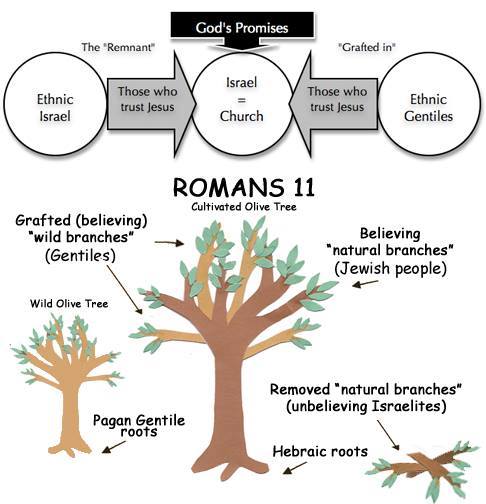
In this regard, see also the following blogs…
Romans 7, Romans 11, Ephesians 2, Revelation 21 and plenty of other Scriptures (mentioned in the above notes) make it ABUNDANTLY clear that we become grafted/adopted into the Commonwealth of Israel when we become Believers in her Messiah, Yeshua. Therefore, keeping this in mind when wondering if we are to still keep the Sabbath and the Feasts, please carefully consider what the following words and phrases mean: perpetual, everlasting, for ever, permanent. By way of example, allow me to show you one usage that we should all be able to agree with:
Exodus 15:18 The Lord shall reign FOR EVER and ever.
Hopefully, NO ONE will disagree with that one! We’d be in a lot of trouble if there is ever a time when YHWH does not reign. OK. The Hebrew word used for “for ever” is “olam” (Strong’s # 5769):
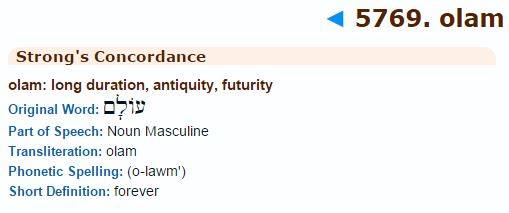
With this in mind, let’s see where else it is used, paying particular attention to it’s usage regarding the following…
The Sabbath:
Exodus 31:
16 Wherefore the children of Israel shall keep the sabbath, to observe the sabbath throughout their generations, for a PERPETUAL covenant.
17 It is a sign between me and the children of Israel FOR EVER: for in six days theLord made heaven and earth, and on the seventh day he rested, and was refreshed.
Regarding the Sabbath, see also the following notes:
My Conclusion: As a grafted in member of Israel (Romans 11), YES, I should still keep the 7th day Sabbath. What about the Feasts?
The Feasts (Note Who’s Feasts they are – hint: they are NOT the Feasts of the JEWS):
Leviticus 23:
1 And the Lord spake unto Moses, saying,
2 Speak unto the children of Israel, and say unto them, Concerning the feasts of the Lord, which ye shall proclaim to be holy convocations, even these are my feasts.
3 Six days shall work be done: but the seventh day is the sabbath of rest, an holy convocation; ye shall do no work therein: it is the sabbath of the Lord in all your dwellings.
4 These are the feasts of the Lord, even holy convocations, which ye shall proclaim in their seasons.
5 In the fourteenth day of the first month at even is the Lord’s passover.
6 And on the fifteenth day of the same month is the feast of unleavened breadunto the Lord: seven days ye must eat unleavened bread.
7 In the first day ye shall have an holy convocation: ye shall do no servile work therein.
8 But ye shall offer an offering made by fire unto the Lord seven days: in the seventh day is an holy convocation: ye shall do no servile work therein.
Passover and Unleavened Bread are uniquely and totally tied together. Regarding Passover, consider…
Exodus 12:14 And this day shall be unto you for a memorial; and ye shall keep it a feast to the Lord throughout your generations; ye shall keep it a feast by an ordinance FOR EVER.
Exodus 12:17 And ye shall observe the feast of unleavened bread; for in this selfsame day have I brought your armies out of the land of Egypt: therefore shall ye observe this day in your generations by an ordinance FOR EVER.
Exodus 12:24 And ye shall observe this thing for an ordinance to thee and to thy sons FOR EVER.
Exodus 12:49 One law shall be to him that is homeborn, and unto the stranger that sojourneth among you.
Call me crazy, but me thinks the Holy Spirit and Moses disagree with MOST Christian “theologians” (who apparently know little to nothing about the front of the Book they claim to follow) today. The Law of Passover is not just for the “Jew” but for all of Israel… and even the “strangers” among them. That would essentially equate to EVERYONE within the “Commonwealth of Israel” who claim to worship YHWH!
Leviticus 23 continues regarding First Fruits…
Leviticus 23:
9 And the Lord spake unto Moses, saying,
10 Speak unto the children of Israel, and say unto them, When ye be come into the land which I give unto you, and shall reap the harvest thereof, then ye shall bring a sheaf of the firstfruits of your harvest unto the priest:
11 And he shall wave the sheaf before the Lord, to be accepted for you: on the morrow after the sabbath the priest shall wave it.
12 And ye shall offer that day when ye wave the sheaf an he lamb without blemish of the first year for a burnt offering unto the Lord.
13 And the meat offering thereof shall be two tenth deals of fine flour mingled with oil, an offering made by fire unto the Lord for a sweet savour: and the drink offering thereof shall be of wine, the fourth part of an hin.
14 And ye shall eat neither bread, nor parched corn, nor green ears, until the selfsame day that ye have brought an offering unto your God: it shall be a statute FOR EVER throughout your generations in all your dwellings.
Now regarding Pentecost….
Leviticus 23:
15 And ye shall count unto you from the morrow after the sabbath, from the day that ye brought the sheaf of the wave offering; seven sabbaths shall be complete:
NOTE: This is known as the “counting of the omer” and it is the ONLY time Sabbaths are counted. So, for instance, when you see “first day of the week” it does not mean what you think it does. Go look in your KJV and you will see that the word “day” is in italics. There is a reason for this – it’s NOT in the text! It was inserted by the translators. In the Greek, “mia ton Sabbaton” it does NOT mean “first day of the week” as in Sunday, but rather it means exactly what it says “first of the Sabbaths.” Sabbaton is NOT the word for “week” it is the word for Sabbath and the word “day” is NOT even in the text! We have antinomian English translators to thank for this error. For more on this, see my blog: First day of the week – or first of the Sabbaths?
16 Even unto the morrow after the seventh sabbath shall ye number fifty days; and ye shall offer a new meat offering unto the Lord.
17 Ye shall bring out of your habitations two wave loaves of two tenth deals; they shall be of fine flour; they shall be baken with leaven; they are the firstfruits unto the Lord.
18 And ye shall offer with the bread seven lambs without blemish of the first year, and one young bullock, and two rams: they shall be for a burnt offering unto the Lord, with their meat offering, and their drink offerings, even an offering made by fire, of sweet savour unto the Lord.
19 Then ye shall sacrifice one kid of the goats for a sin offering, and two lambs of the first year for a sacrifice of peace offerings.
20 And the priest shall wave them with the bread of the firstfruits for a wave offering before the Lord, with the two lambs: they shall be holy to the Lord for the priest.
21 And ye shall proclaim on the selfsame day, that it may be an holy convocation unto you: ye shall do no servile work therein: it shall be a statute FOR EVER in all your dwellings throughout your generations.
22 And when ye reap the harvest of your land, thou shalt not make clean riddance of the corners of thy field when thou reapest, neither shalt thou gather any gleaning of thy harvest: thou shalt leave them unto the poor, and to the stranger: I am the Lord your God.
Now regarding Yom Teruah (the Day of Trumpets) and Yom Kippur (Day of Atonement), which are tied together by what is known as the “10 days of awe” wherein we are to examine ourselves and ask for forgiveness (because the King and His Kingdom are coming)…
Leviticus 23:
23 And the Lord spake unto Moses, saying,
24 Speak unto the children of Israel, saying, In the seventh month, in the first day of the month, shall ye have a sabbath, a memorial of blowing of trumpets, an holy convocation.
25 Ye shall do no servile work therein: but ye shall offer an offering made by fire unto the Lord.
26 And the Lord spake unto Moses, saying,
27 Also on the tenth day of this seventh month there shall be a day of atonement: it shall be an holy convocation unto you; and ye shall afflict your souls, and offer an offering made by fire unto the Lord.
28 And ye shall do no work in that same day: for it is a day of atonement, to make an atonement for you before the Lord your God.
29 For whatsoever soul it be that shall not be afflicted in that same day, he shall be cut off from among his people.
30 And whatsoever soul it be that doeth any work in that same day, the same soul will I destroy from among his people.
31 Ye shall do no manner of work: it shall be a statute FOR EVER throughout your generations in all your dwellings.
32 It shall be unto you a sabbath of rest, and ye shall afflict your souls: in the ninth day of the month at even, from even unto even, shall ye celebrate your sabbath.
The Day of Atonement is also mentioned in some detail in Leviticus 16:
Leviticus 16:
29 And this shall be a statute FOR EVER unto you: that in the seventh month, on the tenth day of the month, ye shall afflict your souls, and do no work at all, whether it be one of your own country, or a stranger that sojourneth among you:
30 For on that day shall the priest make an atonement for you, to cleanse you, that ye may be clean from all your sins before the Lord.
31 It shall be a sabbath of rest unto you, and ye shall afflict your souls, by a statute FOR EVER.
Yes, there are other Sabbaths besides just the weekly Sabbath. Some have referred to these annual Sabbaths as “High Sabbaths”. These are the days wherein it is specified that we do no work (such as also during the first and seventh days of Unleavened Bread – see Lev. 23:7,8 above – and on the first and eigth days of Sukkot – see Lev. 23:35,36 & below).
Regarding Sukkot (Feast of Tabernacles)…
33 And the Lord spake unto Moses, saying,
34 Speak unto the children of Israel, saying, The fifteenth day of this seventh month shall be the feast of tabernacles for seven days unto the Lord.
35 On the first day shall be an holy convocation: ye shall do no servile work therein.
36 Seven days ye shall offer an offering made by fire unto the Lord: on the eighth day shall be an holy convocation unto you; and ye shall offer an offering made by fire unto the Lord: it is a solemn assembly; and ye shall do no servile work therein.
37 These are the feasts of the Lord, which ye shall proclaim to be holy convocations, to offer an offering made by fire unto the Lord, a burnt offering, and a meat offering, a sacrifice, and drink offerings, every thing upon his day:
38 Beside the sabbaths of the Lord, and beside your gifts, and beside all your vows, and beside all your freewill offerings, which ye give unto the Lord.
39 Also in the fifteenth day of the seventh month, when ye have gathered in the fruit of the land, ye shall keep a feast unto the Lord seven days: on the first day shall be a sabbath, and on the eighth day shall be a sabbath.
40 And ye shall take you on the first day the boughs of goodly trees, branches of palm trees, and the boughs of thick trees, and willows of the brook; and ye shall rejoice before the Lord your God seven days.
41 And ye shall keep it a feast unto the Lord seven days in the year. It shall be a statute FOR EVER in your generations: ye shall celebrate it in the seventh month.
42 Ye shall dwell in booths seven days; all that are Israelites born shall dwell in booths:
43 That your generations may know that I made the children of Israel to dwell in booths, when I brought them out of the land of Egypt: I am the Lord your God.
44 And Moses declared unto the children of Israel the feasts of the Lord.
Here is a chart I created to show some of the parallels in the Appointed Times:
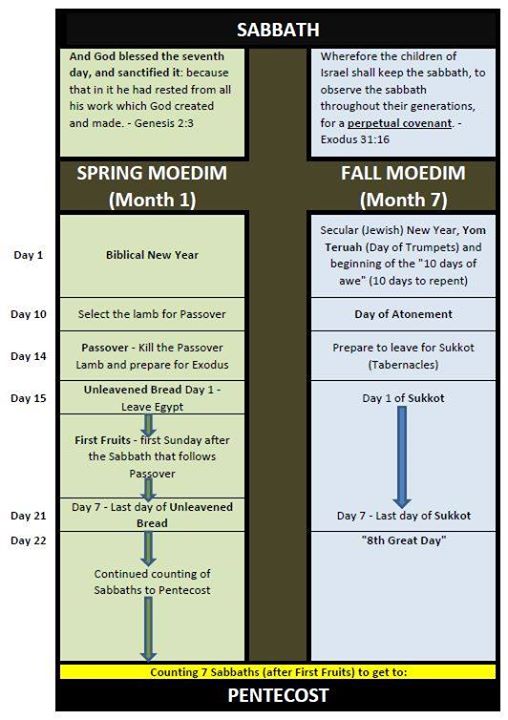
I’ll probably work up some other ones in the days ahead because I think it is needed for us (or at least for me) to gain a better understanding of these things. Because as far as I can tell, FOR EVER means for ever. I see nothing that would indicate for ever has ended. Words mean things. I am choosing to believe them. Am I perfect? Nope. Do I have it all figured out? Nope. But step one is learning about what we do not yet understand. Hopefully, this note will serve as a good first step.
My Conclusion: Yes, as Believers grafted/adopted into the Commonwealth of Israel, we should keep the Sabbaths and the Feasts (Appointed Times) of YHWH. Frankly, I think we are missing out on a LOT if we don’t! I’ve been TREMENDOUSLY blessed as I have begun to keep and observe these things… and I’ve learned more about my Savior than I ever did in the 40+ years prior of doing Sunday church and the Beast Feasts of Nimrod.
Additional reading you may want to consider (and please do before quoting Galatians, accusing me of the usual HRM nonsense and/or asking redundant questions I’ve addressed a few million times already):
This should keep you busy for a while! 🙂
– Rob Skiba
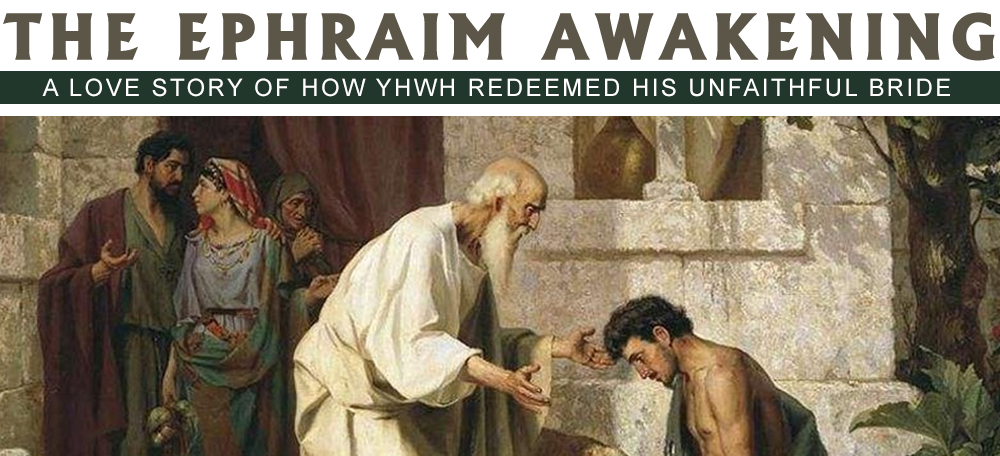

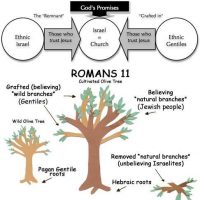

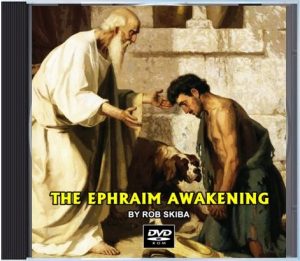


Hi Rob, I’m from Indonesia. I knew you when I visited your seed website and the information on that website on the nephilim etc has been such a blessing for me. But concerning this article, i have some questions :
1. If it’s true that christians should keep sabbath, then what about Galatian 2:14 where it is stated that Peter did not live like a Jews? Also on Act 15, the apostles only told the gentiles believeres to abstain from eating certain food and from sexual immorality, no mention about keeping sabbath and feasts.
2. what happen to christians if they don’t keep the sabbath?
Thanks
Hey brother. Thanks. Please spend time reading through the many blogs on this site as they were specifically created to answer questions like these.